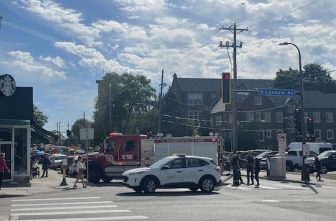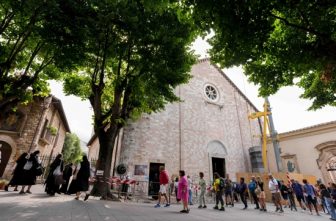
Conflict doesn’t have to be a bad thing in the Church — or in parishes — Ann Garrido told a room of Church professionals Oct. 26.
“Conflict can be a sign of life,” she said. “People only argue about what they care about, and if no one in your parish is arguing, that’s a bad sign.”
An associate professor of homiletics at the Aquinas Institute of Theology in St. Louis, Missouri, and author of “Redeeming Conflict” (Ave Maria, 2016), Garrido spoke to ordained and lay ministers working in parishes and Catholic organizations throughout the Archdiocese of St. Paul and Minneapolis gathered for Fall Formation Day at Mary, Mother of the Church in Burnsville.
In an 80-minute interactive presentation “Redeeming Conflict: Being a Credible Witness in the Midst of Tension,” Garrido encouraged her audience not to avoid argument, but to elevate the argument so that the people involved can understand what’s actually being said. She called this “developing first aid skills” to help people engage in conflict in a way that people involved in a difficult conversation don’t get hurt.
Part of that is recognizing one’s “internal voice,” or the continuous monologue people have in their head, and that the internal voice “gets turned up full volume” as conflict escalates, blocking out what is heard externally from other people in the conflict. Ineffective difficult conversations include a wide gap between what a person is thinking and what he or she is saying, Garrido said.
“If you want to be effective, you have to figure out how to get someone’s internal voice out,” she said.
What constitutes a difficult conversation varies, she said, but they all involve three of the same elements: getting the story right, strong feelings and personal identity.
Garrido suggested people involved in conflict address the first aspect — getting the story right — by asking questions such as, “Tell me what you think I’m missing?” or “What is it that you’re worried about here?”
Second, she suggested people name the feeling they’re experiencing, and “there’s a difference between naming feelings and being emotional.” Telling other people that you’re frustrated can help the conversation, she said, but she cautioned against using the phrase “I feel like … ,” because that often leads to stating, not a feeling, but a position or judgment, which is not the same as naming a feeling.
Third, understanding people’s “identity triggers” is also helpful, she said. These are core values people hold to be true about themselves, and when they’re questioned, people usually react strongly. She said, for example, that she sees herself as a hard worker, so someone’s suggestion that she has been lazy or hasn’t pulled her weight on a project will put her on the defensive.
Learning to handle conflict well can help people navigate differences in the Church, and it actually deepen friendships, she said.
Catholics seems to equate tension with sin, but that’s not necessarily the case, Garrido said. Tension, she said, seems to be “built into the fabric of creation,” and Catholics need to look for a “unity in our diversity” that “molds us into a communion.”
“Communion and diversity — why does that matter so much to God?” she asked. “Because it is God’s name.”
“The communion in diversity is another way of saying Trinity,” she continued. “God, in God’s very being, is trinity. God, in God’s very being, is relationship. Each of us that have been baptized in the name of the Father, the Son and the Holy Spirit, it’s a way of saying, ‘I have baptized you into relationship with me.’ And anything that we can do as a Church to right the capacities of our people to live relationship well, you are preparing them for eternal life, because that’s what eternal life is” — to share in the relationship of Trinity, she said.
“These are the skills we need not just for life on earth,” she said, “but these are the skills we need to be able to enjoy the communion of diversity forever and ever.”
Garrido was the second speaker of the daylong event. Jack Jezreel, founder of Louisville, Kentucky-based JustFaith Ministries, spoke on “Building a Credible Witness in the Parish.” The event also included Mass celebrated by Archbishop Bernard Hebda, Bishop Andrew Cozzens and priests attending Fall Formation Day.



